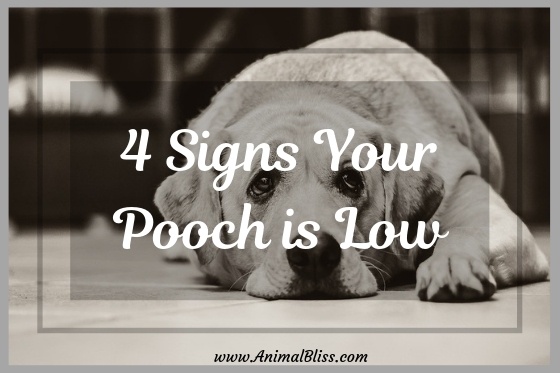4 Signs Your Pooch Is Low
Without a doubt, your furry companion is a constant source of joy in your life. Doesn’t it feel great to be welcomed back home with excitement after a tiring day at work? Most certainly, every pet parent can vouch for the unconditional love their four-legged friend showers upon them. However, it can be extremely worrying to see this furry bundle of joy gloomy and unresponsive at times.
Did you know that dogs experience depressive episodes just like human beings? The only difference is they are unable to express it vocally like us. However, they do display certain signs such as reduced energy levels, change in the sleeping and eating habits, and disinterest in activities they enjoyed in the past.

Major life changes, disruption of normal routine, death in the family, or a new addition (human or pet) to the household are a few factors that can trigger depression in dogs. Paying attention to the warning signs of depression will enable you to take corrective measures to help your buddy get over this low phase.
4 Signs Your Pooch Is Low
1. Change in Eating Habits
Dogs are extremely sensitive to their surroundings. Whether they are unable to adapt to a new environment, missing a loved one, or undergoing hormonal fluctuations, their appetite is one of the first things to get affected. They may either turn into ravenous beasts or completely lose interest in food. Excessive eating and anorexia (loss of appetite) may be rooted in psychological issues like depression.
You know your pet best. Pay attention to any signs of change in its appetite. For instance, your pooch may have been a picky eater, but has lately started devouring any food item that comes their way. This sudden change in their appetite could be a sign of depression.
2. Change in Sleep Pattern
On average, healthy adult dogs sleep for 12 to 14 hours a day. Pups, on the other hand, need 18 to 19 hours of rest each day.
Your dog’s sleep pattern can say a lot about their emotional and physical wellbeing. For instance, if your adult dog is sleeping like a puppy, it may be feeling unfit or low. Similarly, dogs undergoing some mental disturbance may find it tough to get quality sleep, forcing them to be restless and agitated.
3. Exhibits Destructive Behavior
Do you see you furred pal pant, whine, whimper, tremble, or fidget incessantly? Depression can trigger a variety of destructive responses in dogs. For instance, he/she may defecate or urinate around the house despite being toilet trained. He/she may display anti-social behavior by moving away from pets or people.
Excessive paw licking is also an indication that your pal is down in the dumps. Psychological distress can cause them to chew their paws, leading to wounds with bacterial or fungal infections.
So, the next time you see your canine friend licking its paws incessantly, visit your vet to dig deep and proactively manage the situation.
4. Lack of Interest in Physical and Social Activities
Being social animals, dogs love long walks, meeting other pets, exploring the neighborhood, and other outdoor activities. However, depression may cause him to lose interest in these activities and avoid social situations. For instance, if your mutt is always hiding under the couch, it could be a sign that something’s bothering him. Similarly, due to reduced energy levels and mood swings, it may become slow at learning a new game or responding to your call.
If your pet pal seems withdrawn or inactive or loses interest in activities that would typically excite them, something’s not right.
Tips to Comfort Your Mutt
First things first, remember that the signs mentioned above are an indication of an underlying issue. Depression in dogs is a complex disorder that’s difficult to diagnose. Therefore, when you see any of the warning mentioned above signs, it is wise to consult your veterinarian or a canine behavior consultant who can help in diagnosing and managing depression and behavioral issues in dogs.
Further, you can use the following tips to make your furred friend feel well again.
1. Increase Your Cuddle Time
You don’t have to be a behavioral expert to know that your mutt needs attention. The lack of love and attention can make your pet feel insecure, worsening its depressive symptoms. This is especially relevant if your mutt is left alone for long hours while you are at work.
Give your furry pal as much time as you can. Express your pooch love by petting, cuddling, or giving him positive feedback.
2. Jazz It Up
Music is therapeutic to man and canines alike. Research has proven that effective music therapy can soothe their psychologically distressing symptoms, helping them get peaceful sleep. No wonder, Spotify recently introduced a music playlist specifically for dogs, encouraging pet parents to spend some quality time dancing and singing with their fuzzy mate. So, go ahead and jazz up the evening with your canine buddy, making him/her feel loved.
3. Go on an Exploration Spree
Visit a new park, walk down a different block in your neighborhood, or go hiking in the woods. Exploring new places means new things to see and new places to sniff around, dig, or pee in. This activity will help your mutt satisfy its innate nature to explore, getting the tail wagging in no time.
4. Rely on Natural Remedies
Natural remedies can work wonders for your ailing four-legged pal as they are instrumental in alleviating the symptoms of depression and are devoid of side-effects.
For instance, CBD oil, or cannabidiol, is proven to relieve the symptoms of depression and anxiety in dogs. These include loss of appetite, lethargy, and body pain. Similarly, calendula possesses potent anti-inflammatory properties, making it the ideal remedy for itchy skin and hotspots in dogs.
Nature has a whole lot of solutions to comfort your pet’s ailments. However, it is wise to talk to your vet before building an all-natural medicine kit for your pooch.
It can be worrying when your canine sidekick is not as healthy, happy, and energetic as it used to be. Don’t let canine depression get the better of your four-legged companion. Use the valuable advice shared in this post to diagnose the health issue and help your furry partner bounce back.
~~~~~
 Guest Author: Vivek Patel
Guest Author: Vivek Patel
When it comes on a dogs health and safety Vivek Patel never misses an opportunity to share his knowledge with pet lovers. He works tirelessly to write about dog health, behavior, and training skills; besides this, he is the digital marketer and Local Search Specialist at E2M Solutions. He turns innovative ideas into achievable search strategy. You can reach him on twitter @vivekrpatel.
- 4 Tips for Maintaining Healthy Weight for Your Cat - December 20, 2019
- 8 Amazing Benefits of CBD for Dogs and Other Pets - December 12, 2019
- Kibble or Canned Pet Food? What Should Your Pet Be Eating? - December 9, 2019
